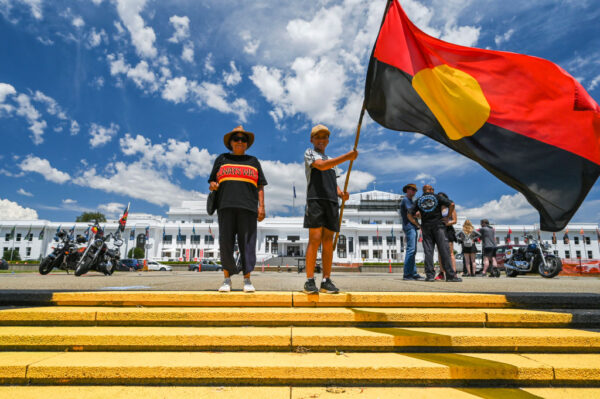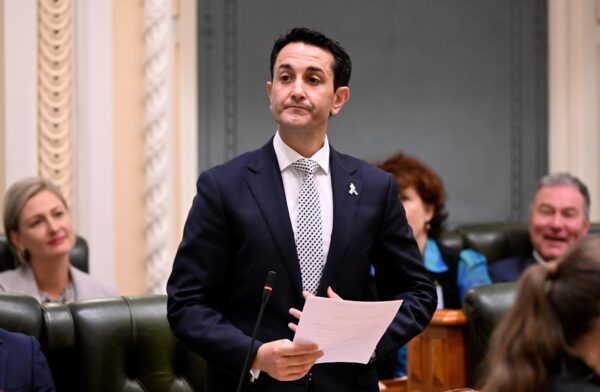


Commentary
In May, with the support of the opposition and the Greens, the Queensland Parliament adopted the Path to Treaty Act 2023.
Although Australian papers and opinion pages are saturated with stories about “The Voice” and First Nations’ claims to sovereignty, there has been little discussion of this potentially divisive Queensland legislation.
Unsurprisingly, the long-serving Labor premier, Annastacia Palaszczuk, used her party’s majority to steamroll this legislation through Parliament. But what is surprising, even disturbing, is that the opposition would sheepishly support it, effectively championing Labor’s social engineering agenda.
The inability of the opposition to rely on the principle of political equality for all was on display on May 10.
The opposition leader, David Crisafulli, has since insisted that he will “absolutely not” roll back Indigenous treaty legislation if he becomes premier next year, even if there is intense pressure from his party to overturn it.
The main purpose of the legislation is to establish the First Nations Treaty Institute to develop a framework to support Aboriginal and Torres Strait Islanders to enter and participate in Treaty negotiations.
It will also establish a Truth-telling and Healing Inquiry to investigate and report on “the impacts of colonisation on Aboriginal peoples.” This is expected to take three years.
While history is a useful subject because it explains where we come from and how our institutions were formed, there is little hope that this Inquiry will manage to describe the state’s history objectively.
History as a specific subject has not been taught in Queensland’s primary schools since 1972 when a new social studies syllabus was introduced in schools. Hence, there is no tradition of historical research; it has been replaced by a result-oriented government narrative.
If past practices are a guide, the chances are that the Inquiry will rewrite history by castigating white people as vile colonialists and racists and provide the Aboriginal community with reasons to accept the government’s victim narrative that is so effectively drummed into people as truth.
“All Queenslanders will benefit from a reconciled Queensland, and we are committed to working with Aboriginal and Torres Strait Islander peoples towards reconciliation, truth-telling and healing, and reframing the relationship,” the premier said.
The Treaty Institute will be yet another Aboriginal quango, consisting of 10 people.
It is a bit of a mystery how these new state institutions will interact with The Voice if the referendum is successful later this year.
Only Aboriginal or Torres Strait Islander people will be allowed to become members of the Treaty Institute Council. Although there are further requirements to ensure gender balance and diversity, the law does not explain how Aboriginality will be determined.
It is obvious that intrusive administrative or legislative rules would have to be adopted to determine who is a member of the Aboriginal race and, therefore, eligible to sit on the Institute’s Council.
However, even common sense suggests that any attempt at describing people along racial lines is fraught with danger.
Not only would it create a two-tiered society where political equality or equal citizenship are distinct remnants of a saner past, but the legislation is reminiscent of the purity laws introduced in Nazi Germany to determine who was Jewish.
An attempt by the One Nation Party to have a private members’ bill on Aboriginal identity failed in the Senate because it did not even allow for a debate to take place.
It can be expected that more people will identify as Aboriginal, even through the most tenuous links, while being almost entirely Caucasian.
I have also talked to frustrated people who intimated they want to distort the system by simply ticking the First Nations box on the next census document.
Indeed, in 1971 there were only 106,000 Aboriginals, but that number increased to over 800,000 in the 2021 census.
So, the question can be asked: “Why does the opposition go along with this legislation?”
The federal opposition leader, Peter Dutton, is displeased with these developments in the Liberal National Party in Queensland because it undermines the national party’s decision to campaign for a “No” vote in the upcoming Voice referendum.
It is also instructive that Crisafulli has not joined his federal colleagues in their “No” campaign but, instead, has encouraged people to be open-minded to the reasons that the government has put forward.
In a recent letter, a conservative voter, frustrated by the support given by the Queensland Liberal to the Treaty bill, stated:
“I am absolutely dumbfounded at the inexcusable stupidity of your Liberal National party to give bipartisan support to the Palaszczuk government to implement a ‘Treaty’ with 150 Aboriginal organisations … along with ‘truth-telling’ and subsequent reparations amounting to millions of dollars of taxpayer money. Your party members must be blissfully ignorant about what is at stake here.”
The opposition’s support is a recipe for disaster that will keep the Liberal-National Party on the opposition benches for a long time. It is yet another example of trying to out-Labor Labor.
The Path to Treaty Act is bad legislation; it is divisive, and it is an example of profligacy and a slap in the face to the silent majority of concerned Queenslanders.
Views expressed in this article are the opinions of the author and do not necessarily reflect the views of The Epoch Times.


